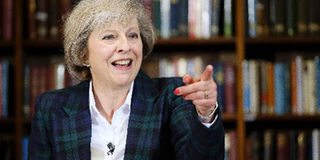May tipped to take over from British PM Cameron

British Interior Minister Theresa May addresses a press conference in central London on June 30, 2016, the day she announced her bid to succeed Prime Minister David Cameron, saying negotiations to leave the European Union should not begin before the end of the year. PHOTO | FRANTZESCO KANGARIS | AFP
What you need to know:
- Dozens of Conservative Members of Parliament have backed her bid to take over from David Cameron, who announced his resignation after losing a referendum last week in which 52 per cent of Britons voted to quit the continental bloc.
- Britain has been plunged into extraordinary political turmoil since the vote, with the ruling Conservatives and opposition Labour party in disarray and the country deeply polarised.
Britain’s Interior Minister Theresa May built up support for her campaign to be the prime minister who will lead the country out of the European Union following former London mayor Boris Johnson’s shock withdrawal from the race on a day of high political drama.
Dozens of Conservative Members of Parliament have backed her bid to take over from David Cameron, who announced his resignation after losing a referendum last week in which 52 per cent of Britons voted to quit the continental bloc.
Britain has been plunged into extraordinary political turmoil since the vote, with the ruling Conservatives and opposition Labour party in disarray and the country deeply polarised.
May supported the “Remain” campaign during the referendum but has assured “Leave” supporters she would proceed with Brexit although she said she would not begin formal talks with the EU before the end of the year.
The Daily Mail newspaper, widely read among the Conservative grassroots supporters who would ultimately select the new leader, endorsed her with a front-page headline.
“A party in flames and why it must be Theresa,” it said.
EU leaders have called for a swift divorce following last week’s seismic referendum result, fearful of the impact of Britain’s uncertain future on economic growth and the potential domino effect in several eurosceptic member states.
Far right parties in the Netherlands, France and Slovakia have already called for similar votes in their countries.
May is clear favourite to replace Cameron as Conservative leader and therefore prime minister—a switch that requires no new general election under the British system.
The outcome of the June 23 Brexit vote unleashed the worst chaos in living memory in British politics, with opposition Labour chief Jeremy Corbyn’s leadership also under threat and Scotland’s government fighting for independence from the United Kingdom to keep its EU membership.
The Scots overwhelmingly voted to remain in the union.
Justice minister Michael Gove, a top Brexit campaigner who torpedoed former London mayor Johnson’s chances by announcing his candidacy on Thursday, is seen as May’s main rival.
“This country voted for change and I am going to deliver it,” he said in a speech in which he repeatedly stressed May’s support for “Remain”.
“The best person to lead Britain out of the European Union is someone who argued to get Britain out of the European Union,” he said, adding that he would end free movement for EU citizens if he became prime minister.
Gove, the intellectual face of the “Leave” campaign to Johnson’s charismatic frontman, insisted he would not be rushed into formal talks on leaving the EU.
“We will do it when we’re good and ready,” he said.
Cameron, who called the referendum in what was seen as an effort to see off a challenge from an anti-EU party, has said he would leave it to his successor to start formal exit negotiations.
Simon Usherwood, senior fellow at the UK in a Changing Europe think tank, said the differences of a May or Gove premiership in terms of negotiations with the EU were likely to be relatively small.
“The key will be what the EU is prepared to offer,” Usherwood said.
Asked whether there was a possibility the interior minister could row back from the Brexit vote if she became leader, he said: “After the past week anything is possible but, realistically, no”.
The bitterly divisive campaign also exposed rifts within Labour, where Corbyn has been heavily criticised for his lukewarm advocacy of the campaign to stay in the EU.
A large majority of Labour MPs supported a vote of no confidence in Corbyn, a veteran socialist with grassroots support who only became leader last year.
But he has defied his centre-left critics to insist he would hang on, challenging them to mount a full leadership contest.
The British pound crept back up on Friday after the Bank of England hinted that it was ready to cut interest rates in the wake of the Brexit plebiscite.
Highlighting the uncertainty the “Leave” vote has created for business, low-cost airline easyJet said on Friday that it was attempting to acquire a certificate to operate in a European country “to enable easyJet to fly across Europe as we do today”.
The referendum outcome triggered anger among those who wanted to remain in the EU.
More than four million people have signed a petition calling for a second referendum.
The five Conservative leadership candidates would be whittled down to two by a series of ballots by party MPs in the coming days before being put to a vote of the party's members.
The winner would be announced on September 9.
The power struggle between Gove and Johnson brought comparisons to Shakespearean tragedies like “Julius Caesar”.
One lawmaker compared Gove’s actions to those of a murderous Macbeth.
Senior Conservative Michael Heseltine launched a stinging attack on Johnson for “leaving the battlefield” after creating Britain’s “greatest constitutional crisis of modern times”.





